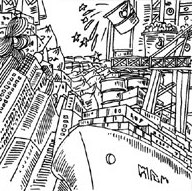
No monetarist contractions can last very long in China, a country that has been depending on relatively higher growth in GDP for solving many of its problems.
One has reasons to guess this would also be more or less true in many developing countries, where a certain level of growth could lend a lot of comfort to the government and to job seekers.
But at a time of dangerous financial problems, featuring hungry investment and high prices of key production materials, as some observers have pointed out, it is not easy for any economy to just grow out of its current problems.
But in the Chinese context, the argument only seems half-right. Can this economy afford an allround contraction? Can high interest rates and high exchange rate help the country become more competitive and its factory owners more enthusiastic about cutting cost?
No instant effect has been reflected in the domestic business press. Financial institutions, facing sluggish trading in the stock market and declining loan business, cannot be made to learn self-discipline and raise competitiveness in a short time. Considering the basic fact that major banks and investment houses are in the State sector, it may be unrealistic to hope that they will be active in learning anything at all.
While day after day descriptions of sharp downturns in sales are reported about the export-oriented companies in all once-booming coastal cities, local entrepreneurs and officials are crying out asking Beijing to address their woes. So, in response, we heard officials from the National Development and Reform Commission, the nation's top economic administration, saying that measures in China's "macro-economic readjustment" have all done their work, indicating there will be no need to tighten the financial control further. Or, put it straightforwardly, so much for the monetarist moment.
It is hard to rate the economy's health by looking at a few financial indexes. The government is duty-bound to seek a balance between them and other more politically significant factors - like employment and government revenues.
Having said this, however, there is little room for old-style growth or development. For the next few years, China can still manage to grow by spending generously on public infrastructure and urban environment. But beyond that, things would appear quite unstable if growth, especially that of manufacturing, continues to depend on ever-increasing material imports.

While the price of oil has come down, and may become still lower than now, the tight supply in raw materials is an indisputable fact. There is little chance for the oil price to come down to the level of a couple of years ago, either.
Inflation will keep haunting the world and lead to many changes in consumer behavior - especially when it is compounded with the losses from the subprime crisis in countries which most of China's export goods target.
Developing countries can possibly keep up their development by re-defining growth and their growth strategies. And the only thing that they can realistically do is invest as much as possible in the green businesses - in affordable technologies which are welcomed by the environmentally-conscious new consumers and also help reduce their dependency on the increasingly expensive imported materials.
Peter Drucker, the late American "management guru", once advised us not to regard a profit simply as a profit, or the money that we can afford to squander. Today's profit is tomorrow's cost, he said, or the money that we have to invest in new growths.
So it may not appear wise for the Chinese companies to shop for financial assets abroad, especially before they completely get over their problems. Instead, they should be busy importing technologies.
E-mail: younuo@chinadaily.com.cn
(China Daily 08/11/2008 page7)

